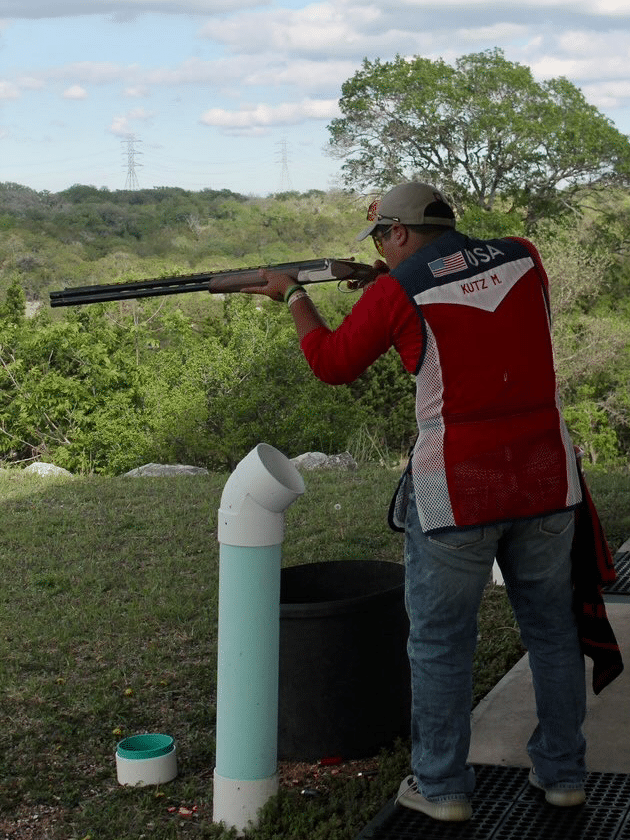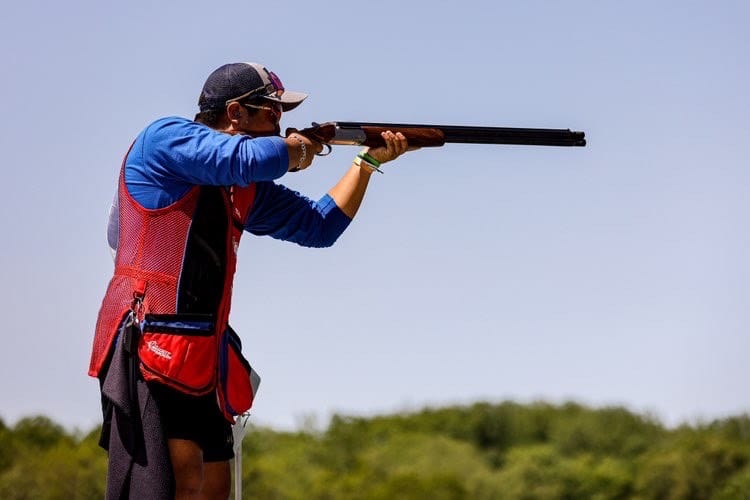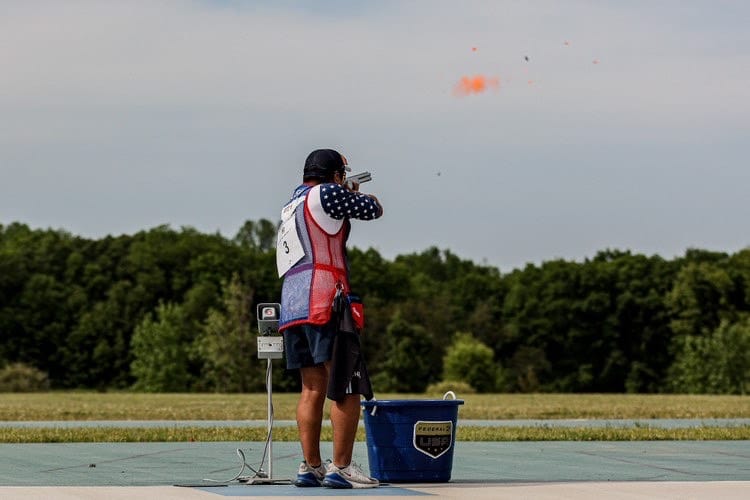It’s June 8th, 2023 in Suhl, Germany, and Matthew Kutz stands at the final firing position with his shotgun ready. He’s waiting for the last target to fly up so he can knock it out of the sky. The crowd around him is silent, dripping with anticipation. The clay disc is launched, and Kutz mirrors its path through the blue background with the bead at the tip of his shotgun just ahead of the orange object. He smoothly squeezes the trigger as the target nears the apex of its travel and snipes it out of the air. A loud cheer resonates around him, and deservedly so—it is Kutz’s 47th hit out of a possible 50 in the final round, earning him a gold medal at the International Shooting Sports Federation Junior World Cup.
Kutz is a self-described “regular college student” at Schreiner University in Kerrville, Texas. Like many 20-year-olds, he enjoys video games (Rainbow Six Siege in particular), pool, foosball, hanging out with his girlfriend, and even just relaxing when he gets a break from his hectic workload.
But, unlike most other kids his age, he also travels the world with his shotgun competing in Olympic Trap.
The Goliad, Texas, native has only been active in the sport for three years, but he’s already racking up accomplishments. He has joined his USA Shooting teammates to compete in locations as far-flung as Germany, Morocco, and Croatia. Now, he is laser-focused on qualifying for the 2024 Olympics in Paris. Despite his relative newness to the event, Kutz has found it to be his calling.
“There’s so many opportunities that come with it,” he told The Reload. “It’s fast paced and exciting. I fell in love with it.”

Growing up in Goliad, a town with under 2,000 people in south Texas, Kutz was born into a culture that introduced him to firearms early in life. His family, friends, and neighbors fostered a community that encouraged young people’s interest in guns but also emphasized the importance of understanding how to properly handle them.
“Being raised in that culture, you know, very early on, we were taught about gun safety, we were taught about our right that we have as U.S citizens to be able to carry guns,” Kutz said. “Whether it be to protect ourselves, or to just use recreationally or for hunting.”
He credits his parents and grandparents for teaching him about guns and getting him involved in competition at an early age. Kutz uses “we” when describing the big decisions around competing and training when telling the story of his journey through the sport shooting world. His maturity and independence today have come thanks to the guidance he’s received from the beginning.
When discussing his most significant influences, Kutz’s mind goes right to his parents. He doesn’t focus on specifics they taught him about competition strategy or shooting techniques but, instead, about the values they have instilled in him. Among the most important ideals he learned were feeling comfortable in his own skin and never changing who he was to try and please others. The idea is to be prepared for all of life, not just the next competition.
“Just be true to yourself, they always told me,” Kutz said. “I know that sounds cliché but that’s just what I lived by growing up.”
Kutz’s first experience with an organized shooting program was with 4-H, a nationwide program focused on developing young people as responsible citizens and future leaders. In third grade, he attended an event led by the organization’s shooting-sports branch and started learning rifle shooting.
Today, Kutz seems like such a cool operator that you would imagine his transition to shotgun, even back in the fourth grade, was smooth. But fear of the shotgun’s recoil actually brought him to tears at first. It took his parents’ persistence to even get him out of the car to try it.
“I was so scared because I was little,” he recalls. “I thought the kick of a shotgun would blow me away.”
But soon a host with the shotgun club gave him a pot holder to place on his shoulder, perhaps more for mental cushioning than physical protection, and that helped ease his nerves. After trying it, he realized the gun’s kick wouldn’t hurt him. It may not have been love at first sight, but he conquered his youthful fears even as he wasn’t sure where the sport would lead him.
“It was cool, but, at that age, I’m not thinking that all I want to do with my life is shoot a shotgun,” Kutz said. “I was like in fourth grade, all I care about is Legos.”
As he got older, Legos eventually gave way to sports, and while Kutz played football and basketball all the way through high school, his interest in sporting clays endured.
Nationwide, shooting sports are less popular than other sports he played, but they have seen significant growth in recent years. And in places such as South Texas, the culture lends itself to young people getting involved early. Shooting sports have their own unique appeal too. They tend to require skills that are different from what’s needed to excel in basketball, football, or track. The hurdles tend to be mental rather than physical. Intense concentration is required. Competitors need to develop precise hand-eye coordination, yes, but diligence and mental focus are even more important to perform at a high level. Kutz found it captivating. Working to get better at something this hard was just what he craved.
“I’ve always been intrigued and drawn to things that are a little more difficult,” he said with a sliver of a smile. “I think that was what really drew me to the competitive side. It was just the challenge, and embracing the challenge.”
In competition, Olympic Trap is set apart from other shooting disciplines by its added difficulty. While American Trap has just one machine that launches targets, Olympic has 15 (three per station). On top of that, targets are moving at about 68 mph, compared to about 45 mph in the American version. Gayle Browning, a 2020 silver medalist for Team USA, has said it’s often considered the hardest target sport there is because “the angles are harder, the speeds are faster.” And Kutz will be facing a steep total of 250 targets at Olympic qualifiers in March.
The pressure to win is also compounded by the high cost to compete. Between guns, ammo, competition fees, and other necessary purchases, the cost of training can be discouraging.
In his words, Kutz has “had to grow up fast.” He has been traveling frequently for competitions since he was 16. Experiencing new countries can put the world in perspective, and Kutz’s time abroad has thrust the need for maturity upon him. He still has to keep up with his collegiate studies, and he’s two years from graduating with a degree in Business and in Sport Management (his dream is to have a marketing position with his beloved San Antonio Spurs). It’s a load that makes him busier than the “regular college student”–or even the average collegiate athlete.
But it’s something he clearly enjoys. He says he’s blessed to be at Schreiner University competing in the sport he loves with friends. The memories he holds dearest don’t just stem from the medals he has won, but also the time spent on the road with teammates, building relationships, and ribbing each other daily.

The fan encounters are fun too. Kutz smiled while recalling one of his favorite clay shooting memories, a surreal-feeling moment when a few little kids approached him at a shooting event back home.
“They’ll come up to me and shake my hand and say it’s really cool to meet me or something, and I’m trying to keep myself grounded because to me I’m not anything special,” he said.
He may be too humble to admit it, but he has set himself down a path that does make him special. In 2020, at his first Olympic Trap competition with training experience, he won. Just a month later, he won the US Grand Prix in Pennsylvania. The list of accolades has only grown since, and he’s come a long way since crying at the thought of firing a shotgun.
Now, it’s all about making it to Paris next summer in order to move beyond special and into an altogether different category: Olympian.
After the first round of Olympic selection, Kutz is sitting in 8th. He needs to move into the top two to make the team. While he has ground to make up, the scores are close. An excellent performance at the next round in the spring could land him a ticket to the French capital.
He’s already planned out his next few months on the way to that goal.
“A lot of school, a lot of training,” he said. “We still have 250 more targets to shoot come March.”




